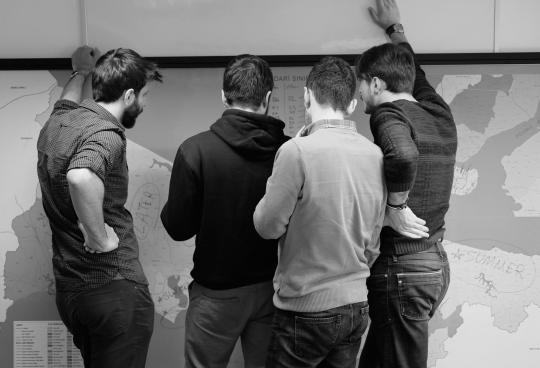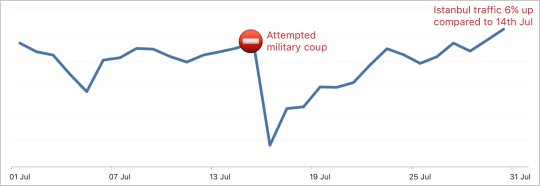This post isn’t for the easily offended. If you’re the type of person who puts 2 and 2 together and gets 5, I suggest closing this tab and reading no further.
–
I was chatting with Oytun, our Turkey country manager, this past weekend, because I’ve been quite concerned about what’s going on in Turkey. I was worried about our team’s safety and well-being (in addition to being concerned about the well-being of the world in general). Oytun reassured me that Turkey is a resilient country, that it always bounces back in about 2 weeks, and that I shouldn’t be worried.
That thought stayed with me, and I figured that our traffic data in Turkey should very easily be able to prove the hypothesis that Turkey bounces back in two weeks. After all, the frequency of eating out is a fair indicator of how a country is reacting to a particular terror attack or situation.
For those not in the know, here’s some context on Turkey. The country has seen more than its fair share of unrest in recent times. Since the start of 2016, they’ve suffered a series of attacks and events that have put the country on high alert. Istanbul alone has seen three violent attacks, and been at the centre of an attempted military coup.
Every time one of these events occurs, we see a country that reacts the way any country in its place would: businesses pull down their shutters, people stay indoors, security measures are beefed up, and day-to-day life is disrupted. Sitting helpless thousands of miles away, it’s terrifying – all we can think of is the safety of our colleagues, and pray that normalcy will be restored soon.
–
Something that’s amazed us is how – every time, and without exception – our team carries on with business as usual (while taking all necessary precautions, obviously). We can put this down to their incredible resilience and work ethic.

But what about the rest of the city? Does it actually take Istanbul as a whole just two weeks to get back up on its feet and get back to life?
One rarely gets to see that from an outsider’s perspective (and we were curious), so we started digging through Istanbul’s traffic patterns on Zomato. Here’s what we found:
Our website traffic in Turkey drops by as much as ~50% in the immediate aftermath of an event, but recovers to its original point within ~10-15 days.
Here’s some data to illustrate this better.
- Attacks in Ankara (March 13th) and Istanbul (March 19th): The attacks in Ankara on the 13th of March had a strong effect on traffic in Istanbul, causing a sharp dip in traffic. Just six days later, on the 19th of March, Istanbul was hit by attacks. However, the effect it had on traffic was nowhere nearly as dramatic. By the 27th of March – just two weeks after the attack in Ankara – traffic in Istanbul had returned to the point it was at just before the attacks.

- Attempted military coup across Turkey, July 15th-16th: Between military-imposed curfews, widespread protests, and the declaration of a three-month state of emergency, Turkey seemed to be in complete disarray. By the end of the 16th of July, our traffic in Istanbul had dropped to almost nothing. But by the 30th, it had recovered the gap and then gone on to grow to 6% higher than it was on the 14th of July.

Interestingly – but not entirely surprisingly – delivery restaurants gained more share of the recovering traffic (compared to dine-out restaurants) after these events. Dine-out restaurants’ traffic was also near normal within two weeks. What does that tell us? That slightly fewer people want to head outdoors to eat in the wake of any unrest, simply because it’s safer to stay indoors.
–
The hypothesis was right: two weeks.
It takes Istanbul two weeks to bounce back from events that have rocked the city. It speaks volumes of the fortitude of the Turkish people, and their ability to get on with their lives.
When I mentioned this to someone yesterday, they argued with “Yeah, but many cities bounce back from adversity. What makes Istanbul unique?” To be honest, we don’t have a benchmark to compare Istanbul to – and we hope we never do. No city, and nobody, should have to suffer what Istanbul has in recent times.
This post is simply a salute to a city with immense courage; a city that refuses to take things sitting down. But more than that, it’s a tribute to my colleagues in Istanbul, whose unyielding and eternally positive spirit is an inspiration to us all.

